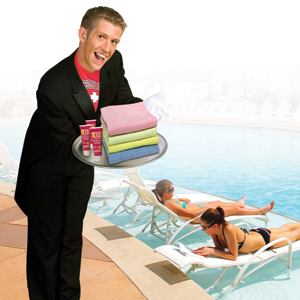In an age of constant communication, when e-mail and texting have the nation all a-Twitter, communication with members and guests continues to be an area that needs the most improvement. For the most part, the age group that safeguards the guests at our aquatics facilities believes that they are a generation of master communicators, but nothing can be farther from the truth.
These days, customer service skills are just as important for a lifeguard — and the long-term health of your facility — as their ability to scan your water and perform rescues. As the public deals with the recession, it is more selective with leisure or fitness purchases. The competition for a family’s discretionary funds is fierce. Everyone and everything now matters, more than ever.
Many operators have developed in-service training programs that work well to develop lifeguard and staff skills when it comes to rescues, scanning and crowd control. But how do you develop well- rounded guards who can also be “goodwill ambassadors” at your facilities? Gossip, bad information and teenage speculation can set back your customer service, marketing and bottom line. In-service training in areas of customer service should be a vital part of your staff’s education.
Throughout Europe and Scandinavia, cross-training exists that creates an aquatics center employee who can potentially work all areas of the facility, from lifeguard to maintenance, front desk and restaurant. This gives the employee an understanding of what it takes to make a facility successful.
OK, don’t get excited! I am not suggesting that we follow that model here in the good old USA, but it does give support to the concept of “everything and everyone matters.” Our job as supervisors is to constantly prepare our employees for advancement. Understanding how a facility operates is essential to the development of our future industry leaders — and providing top-notch customer service.
How often have you had to “undo” the comments of a young lifeguard? How many conversations have you had to have with members or guests when teenage speculation on the reason for a policy went far afield from reality? For example, first aid policies that prohibit the application of sprays, lotions and antibiotic cream could be translated by a seasonal employee as “we don’t have anything in the first aid cabinet.” Imagine a mom hearing that one from a lifeguard! You’ll spend weeks explaining away the gossip around the family pool.
Customer service/in-service training that teaches guards how to deal with the public effectively and accurately can reduce or even eliminate such problems. Drills about “on deck” issues such as bullying, arguments, “rubberneckers,” Code Browns and angry guests are imperative in today’s high-stress climate. Tests, drills and flash-card sessions on the rules, regulations and policies of your facility and the “whys” behind them are vital training tools and information.
In this age of litigation, many operators hand out huge staff manuals and staff expectation agreements. But how many of them are actually read?
For those working in seasonal environments, by the time you recruit, train and uniform these employees, you get a few weeks with them and then off they go to sports and colleges. So keep in mind attention spans, memory overload and sleep deprivation — and make these drills fun and challenging for your staff.
Trivia contests on your policies with prizes can work. Incentives for those who consistently provide good customer service also help. Use the “salami” effect with the information: Provide it “one slice at a time.” Use overcast and rainy days to have discussions about your policies and the reasons for them. This will pay back tremendously.
Today, image is everything. A well- dressed, well-groomed and alert team speaks volumes about your facility. Professional lifeguards will command respect when they treat their jobs and physical environment professionally. Members and guests notice everything, from uniforms to signage to cleanliness.
Many of today’s teens and twenty-somethings have never been taught simple social graces such as eye contact, handshakes, “Yes, ma’am,” “No, sir.” This needs not only to be taught, but imitated. Take a look at your own behaviors, appearance and professional attitude on deck and throughout the property. These skills can be taught through repetition and making everything a “teaching moment.” If you believe that everyone and everything matters, eventually your staff will, too.



